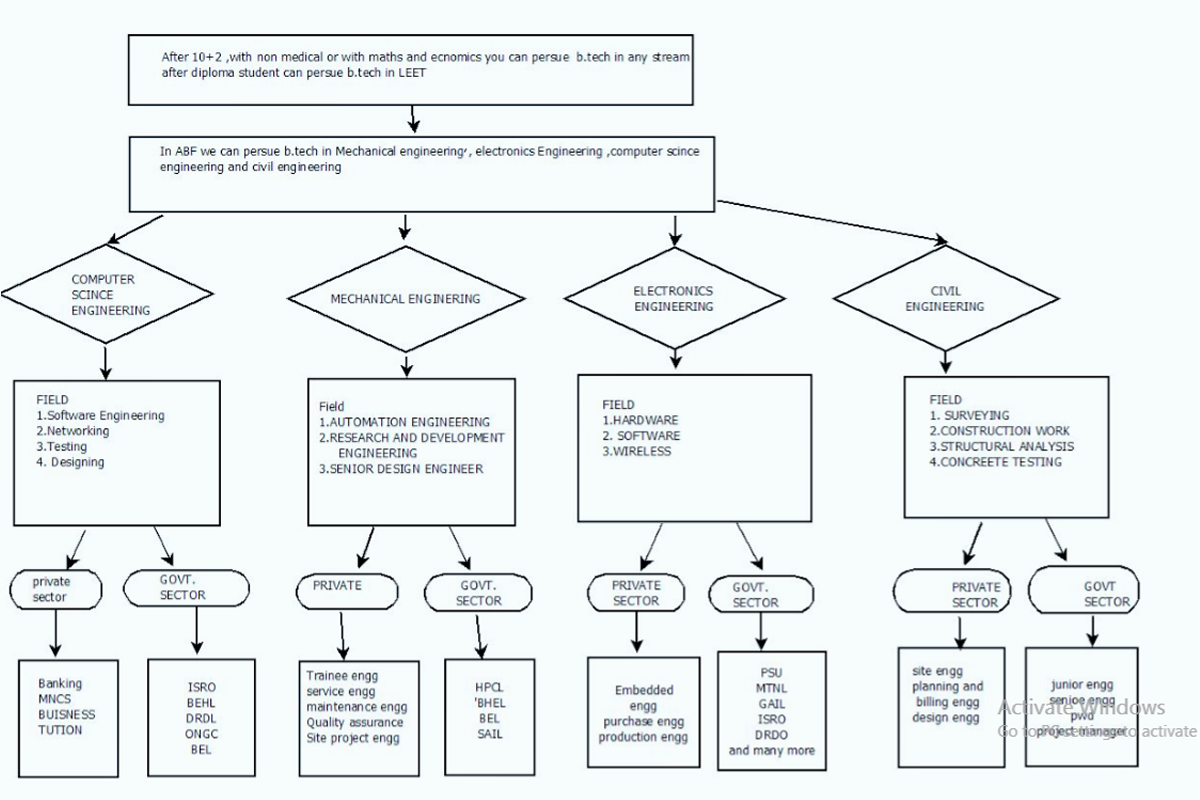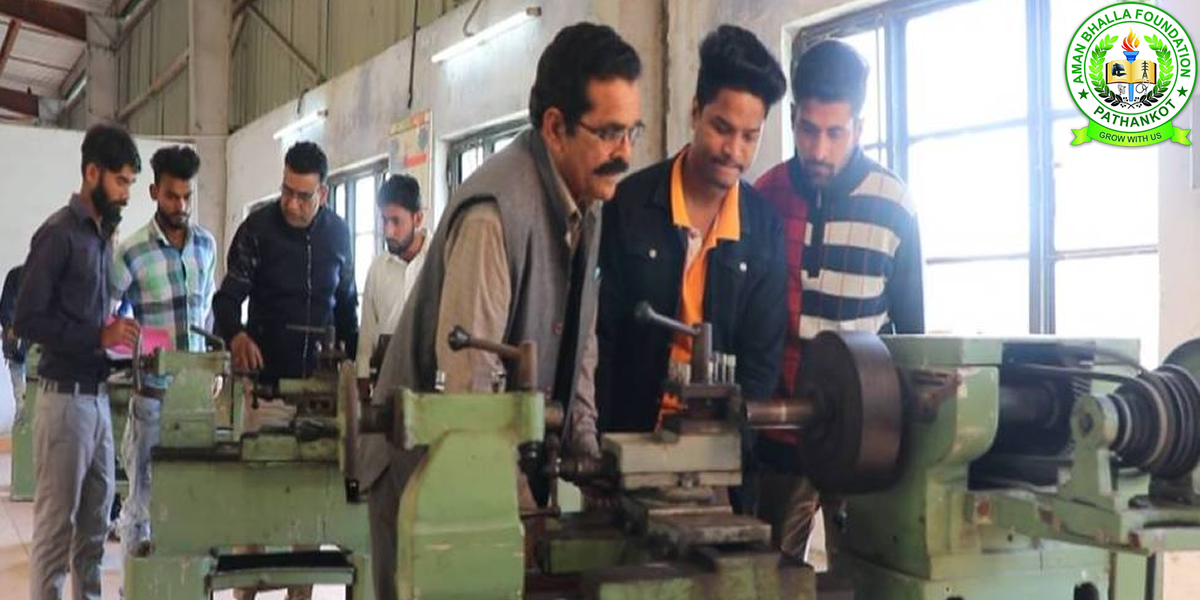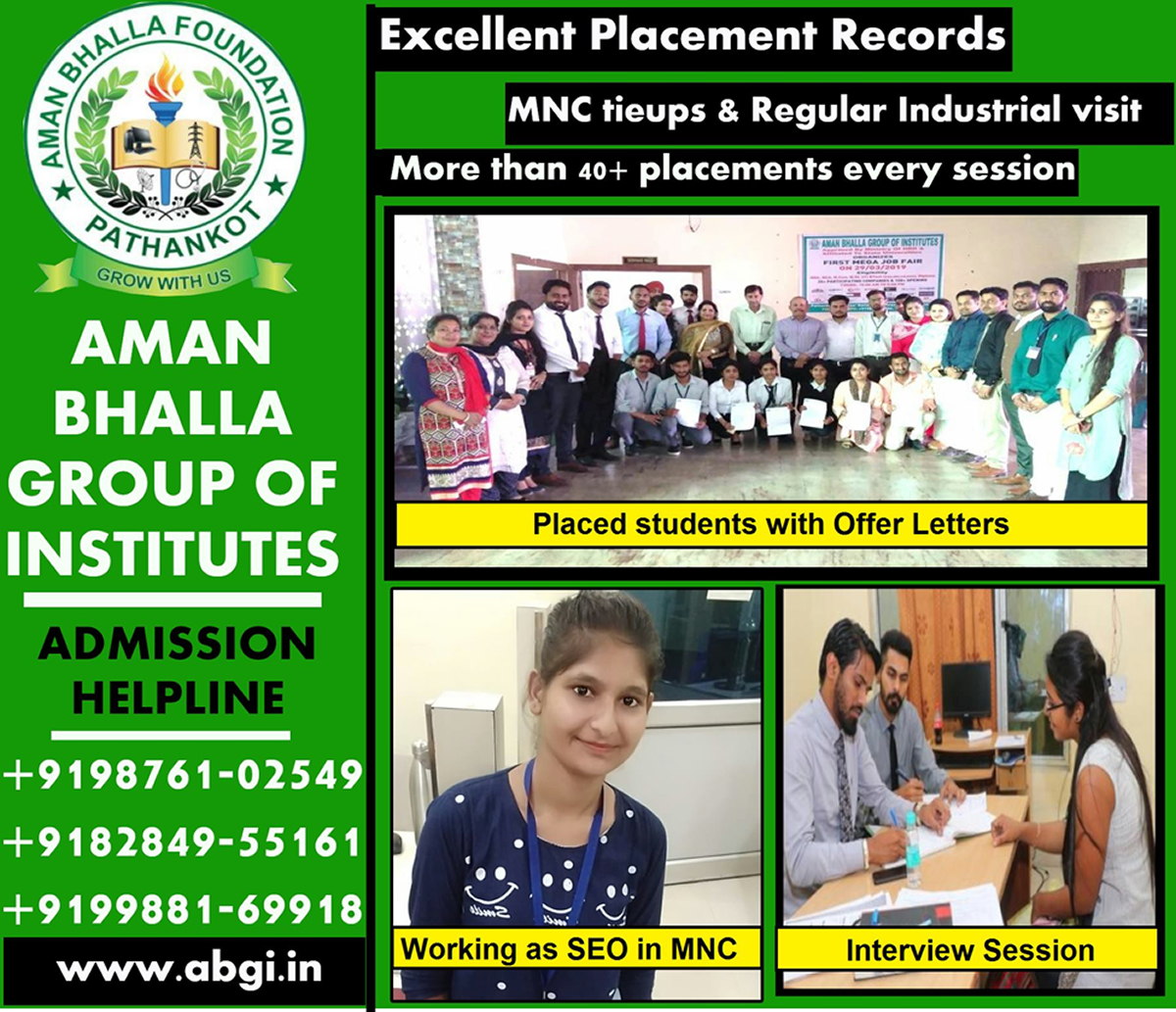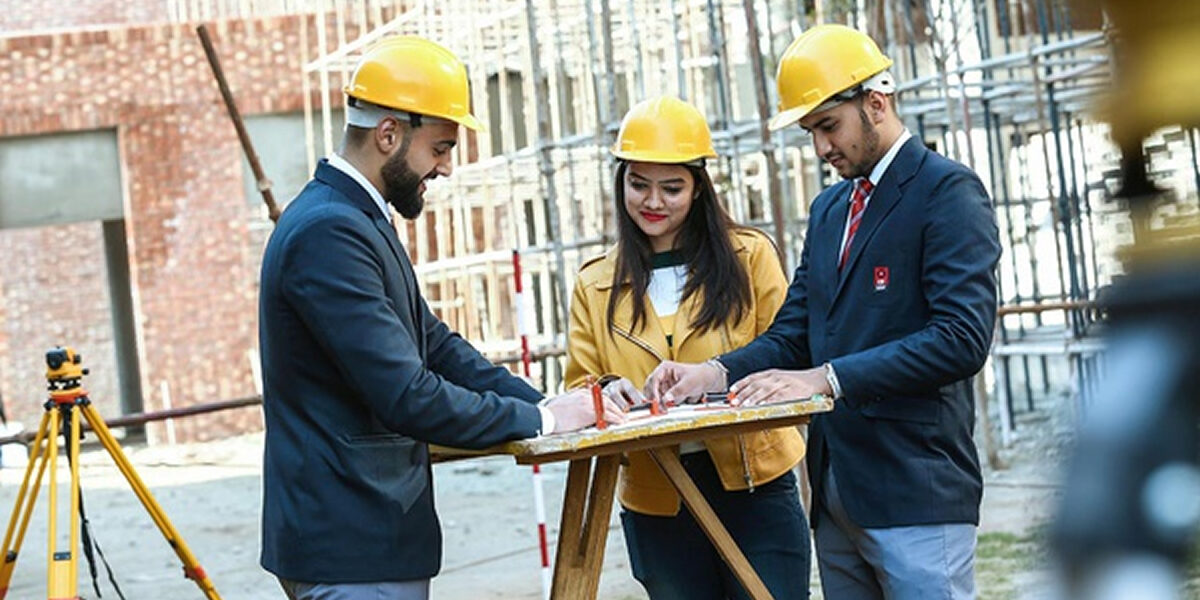What is B.Tech?
Bachelor of Technology is an undergraduate degree program
B.Tech is a four-year full-time degree course consisting of both practical and theoretical knowledge. The degree program is so deliberate that develops the students’ technical knowledge with an enormous number of training sessions provided by Faculty members , webinars and by industry visits.
Btech is also quoted as” jack of all and master in none”.
B.Tech Courses List:
In ABF some of the popular specializations of the Btech courses are as follows:
- B.Tech in Mechanical Engineering.
- B.Tech in Civil Engineering.
- B.Tech in Computer Science Engineering.
- B.Tech in Electronics and telecommunication Engineering.
B.Tech Eligibility Criteria:
- The students with a minimum of 50% (45% for Reserved Categories) in their 12th with Physics, Chemistry, and Mathematics as well as maths with economics their subject are eligible to take admission in B.tech the universities to take the admission.
- Lateral entries with polytechnic and engineering diplomas can get admission in the second year.
- Getting Admission for B.Tech:
There are various entrance exams at both state and national levels like:
Abf engg exam
What B.Tech Engineers do?
In this course, you will get technically sound with various training sessions by the experienced and trained faculties of the Institutes.
Some of the common functions of the B.Tech engineers are given below:
Coding : By learning various programming languages ,we develop the applications.
Designing : By learning various programming languages and framework, we design the application , web pages and websites.
Research and Development: Researching the solution by implementing various technologies to settle any problem in various domains.
Systems Designing: With Research and development, engineers develop some algorithms to design and system for future advancements.
Maintenance: Maintenance plays important role in every sector like production and information technology.
Survey and Analysis: After surveying and analyzing the problems Engineers are responsible for giving solutions to various problems.
Career Options:
In India, this four-year full-time B.Tech degree program is the most successful career option which has a huge amount of opportunities. After completing the course successfully you have many career options in the fields given below.
- Programming and software development.
- Computer science research.
- Telecommunication and networking.
- Web development and the Internet.
- Image processing and multimedia.
- Training and support.

Future plan after B.Tech?
A bundle of options gets open for any candidate, among them some of the common options are:
- Go for Post Graduation
- Management.
- Certifications.
- Entrepreneurship.
- Private Jobs.
- Internships.
- Civil services.
- Army.
- Teaching.
B.Tech in Civil Engineering
one of the getting on and wide-ranging engineering disciplines, Civil Engineering involves planning, designing, constructing, maintaining and supervising infrastructures which include facilities essential to modern life like highways, bridges and tunnels, schools, hospitals, airports and other buildings, sewage systems and water treatment facilities. Subsequently, the course also involves protecting the public and environmental health as well as improving existing infrastructure.
Civil Engineers generally have a lot of specialisations to choose from like:
| Construction Engineering | Coastal and Ocean Engineering |
| Geotechnical Engineering | Fire protection engineering |
| Structural Engineering | General Engineering |
| Bridge Engineering | Irrigation Engineering |
| Land development | Materials Engineering |
| Transportation engineering | Urban Engineering |
| Hydraulic Engineering | Water resources Engineering |
| Environmental Engineering |

The Department of Civil Engineering is one of the oldest Departments. Over the years, the Department has grown many times in different spheres of activities. At present, the Department offers an undergraduate programme in Civil Engineering leading to the B.Tech degree in Civil Engineering.
The department has well qualified and experienced faculty members.
Apart from teaching and research, all faculties are actively involved in training and other extracurricular activities for all round development of the Department. Faculties of this department are also undertaking design, testing & consultancy works for various organizations leading to resource generation for the Institute.
The course curriculum is up-to-date, spanning disciplines that cover both traditional concepts and recent developments. A strong foundation is laid through courses on Concrete and Steel Structures, Geotechnical Engineering, Environmental Engineering, Transportation Engineering, Irrigation Engineering and Computer Application. Beside, students are offered a variety of electives like Hydrology and Dam, Traffic Engineering, Pre stressed concrete, Rock Mechanics, Advanced Environmental Engineering .
The theoretical courses are supplemented by imparting practical experience through well-equipped laboratories.
Program Overview
A degree in civil engineering covers scientific topics; mechanics, hydraulics, materials science and statistical analysis. These foundation subjects will be complemented with the development of design skills, computer-aided design in particular. The final years of any degree will involve the conception of several personal or team projects
Course Offered
| COURSES | TYPE | DURATION |
|---|---|---|
| B.Tech. Civil Engineering | Regular | 4 years |
| B.Tech. Civil Engineering (Lateral Entry) | Regular | 3 years |
Civil Engineering: Eligibility Criteria
Diploma in Civil Engineering
There are many institutes that offer a two-year diploma course in civil engineering.
Eligibility
The aspirants must have passed class X or its equivalent examination with a minimum of 45% marks each in Science and Mathematics as compulsory subjects. The students must have also studied English as one of the compulsory subjects.
BTech Civil Engineering
It is a four-year full-time undergraduate program divided into 8 semesters.
Eligibility
- Aspirants must have passed 10+2 or equivalent examination from any recognized central or state board with Physics, Chemistry and Mathematics as compulsory subjects.
- The admission process of the BTech program is done through the entrance exams such as – JEE Main, JEE Advanced, MHCET, KCET and other exams.
Job Profile After Btech in CIVIL
| Structural Engineers | They design, plan and supervise the construction of infrastructural projects like buildings, bridges, and so on. They also take care of alteration and extension to existing properties or structures. | The national average salary in India for Structural Engineers is around INR 4-5 Lakhs for freshers |
| Geotechnical Engineers | The primary responsibility of Geotechnical engineers is to create projects and find solutions to the problems that are related to geology | The average salary for Geotechnical Engineers is around INR 3-4 Lakhs for freshers |
| Site Engineers | The take responsibility for security, safety, health, organizing, supervising material and people working at the site. They are part of the site management team. | The average salary for site Engineers is around INR 2.5-3 Lakhs for freshers |
| Construction Engineers | The main task includes – to plan, direct, and supervise large construction projects. They act as leader and middleman on construction projects and ensure everything about the project is safe, smooth and structurally sound. | The average salary for Construction Engineers is around INR 3.5-4 Lakhs for freshers |
| Lecturers/Professor | A civil engineering lecturer/ professor imparts knowledge of the subject that would include teaching students about the nuances of civil engineering. | The average salary for Lectureres or Professors in Civil Engineering stream is around INR 3.5-4 Lakhs |
Government Sector
Many enterprises such as ONGC, BHEL, IOC, PWD, Electricity boards, Town Planning department, NHAI, Armed Forces, Indian Railways etc requires qualified Civil Engineers.
In private sector that hire civil engineering graduates are:
- Civil engineers get recruited by Construction Firms, Defence Forces Development Boards Municipal Bodies, etc.
- They work in public and private sectors in all branches of design, construction, maintenance of roads, highways, bridges, dams, canals, docks, airports, housing complexes and in environmental management, etc.
- Civil engineers also work in quality testing laboratories, Military and defence services and as consultants.
| L&T | Maytas Infra Ltd |
| TATA Consulting Engineers Ltd | Land Transport Authority etc |
| Schlumberger | Jacobs Engineering |
| Power Grid Corporation of India Ltd | Shapoorji Pallonji |
| Jacobs Engineering | Jones Lang LaSalle |
Required Skillset for Civil Engineering
- Technical skills, Project Management, Critical Thinking, Communication skills and Creativity are the fundamental skill sets to become a successful Civil Engineer.
- However, if you want to set yourself above in the crowd, here are some desirable qualities you must possess:
| Leadership Skills | Negotiating Skills |
| Attention to Detail | Good Time Management |
| Problem Solving Skills | Ability to Visualise |
| Team Player | Passion for Learning |
List of the students who topped in the university
B.Tech. CIVIL 7TH Semester-Nov-2020
| Sr. No. | Name | Marks Obt. | Total | Photo |
|---|---|---|---|---|
| 1 | Anjali | 8.50 | 10 | |
| 2 | Mehak Fatima | 8.21 | 10 | |
| 3 | Surjit Singh | 8.07 | 10 |
What is Mechanical Engineering?
- One of the getting on and wide-ranging fields of engineering, if you want to deals with machine their design and their construction then choose the Mechanical engineering.
- The programme gives the fundamental knowledge of how heavy tools and machinery work.
- A student pursuing a mechanical engineering programme will acquire knowledge about designing of automobiles, electric motors, aircraft and other heavy vehicles.
- Mechanical engineers design new batteries, medical devices and from personal computers, air conditioners, automobile engines to electric power plants.
- These engineers also design machines that produce these innovations.
The scope of mechanical engineering in India and abroad is huge for every aspect of our lives are touched by mechanical engineering in one way of the other. Spanning multiple industries, the career opportunities for students pursuing the programme is huge.

B.Tech in Mechanical Engineering
Mechanical engineering is the study of maintaining, analysing, designing and manufacturing machinery. This ranges from designing the tiny parts of machines, as well as the handling of large-scale machinery.
Program Overview
The study of mechanical engineering (ME) covers a wide range of topics: computer applications, electricity, structures, mathematics, physics, Automobiles, Strength of Material and drafting. It is considered to be one of the most challenging undergraduate degrees. The field is changing so rapidly, that you may find that when you come to specialize or complete a personal research project in your final year, the topic may not even have existed in your first year.
Like most other strains of engineering, you will be taught through lectures, seminars, tutorials and laboratory sessions, with design classes and practical workshops. You will be assessed continuously through reports, computer exercises, lab work and essays, as well as exam-based testing.
Mechanical Engineering: Eligibility Criteria
The basic eligibility requirement to pursue a Mechanical Engineering programme at the UG level is:
Btech in Mechanical Engineering: </strong
Top companies that hire mechanical engineers
Following are some of the top companies for candidates looking a career in mechanical engineering:
- Escorts
- Tecumseh
- Hindustan Aeronautics Limited (HAL)
- BHEL, NTPC, NHPC
- JCB / Hero Honda
- Railways
- Armed Forces
- Software companies like TCS, Infosys, and L&T
- Other small scale industries
Why Mechanical Engineering
Mechanical engineering is one of the broadest and oldest branches of engineering. Mechanical engineers are involved with the design, analysis, testing, manufacturing, control, operation, and maintenance of mechanical systems – that is, any system that has a moving part! Mechanical systems can vary greatly in complexity and magnitude from the valve in an artificial heart to a car engine to a nuclear power plant. It deals with all aspects of the conversion of thermal energy into useful work and the machines that make this possible.
Required Skillset for Mechanical Engineering
The right set of skills is vital to becoming a good mechanical engineer. You would need the following skillset to make it big in the field.
| Excellent technical skills/knowledge | Budgeting skills |
| Creativity | Ability to work under pressure |
| Commercial awareness | Interpersonal skills |
| Project management | Excellent communication skills |
Students who topped in university
B.Tech.ME-7th Semester–Nov-2020
| Sr. No. | Name | Marks Obt. | Total | Photo |
|---|---|---|---|---|
| 1 | Prabhjot singh | 8.22 | 10 | |
| 2 | Krishma | 7.93 | 10 | |
| 3 | Prabhjot Singh | 7.70 | 10 |
B.Tech in Computer Science Engineering (CSE)
It is an academic programme of the duration of four years which integrates the field of Computer Science and Computer Engineering. The programme primarily lays emphasis on the basics of computer programming and networking while also comprising a plethora of topics. All the subjects and topics that are covered under B.Tech in Computer Science Engineering is related to algorithms, computation, programming languages, programme design, computer hardware, computer software etc. It is a comprehensive course in computer systems and applications.

B.Tech in Computer Science Career Options
After completing the programme of B.Tech in Computer Science Engineering, students usually get placed at some of the best companies. The job profiles offered to these students depend majorly upon the specialisation they have opted for. Computer Science Engineering is a course that enables students to land high paying jobs. There is no sector in the job market in which a graduate of B.Tech in Computer Science Engineering is not required. Some of the leading roles offered to Computer Science Engineers are given below.
- Computer Programmer
- System Database Administrator
- Software Developer
- Software Designer
- System Designer
- Data Warehouse Analyst
- Engineering Support Specialist
- Research Analyst
- Computer Operator
- Programmer
- Programmer Analyst
List of students who topper in university
B.Tech.CSE 7TH Semester-Nov-2020
| Sr. No. | Name | Marks Obt. | Total | Photo |
|---|---|---|---|---|
| 1 | Insha Akhtar | 8.50 | 10 |
Placement

Further Studies After B.Tech in CSE
- MBA in IT
- M.Tech
Benefits of Pursuing MBA in IT
- Improved leadership and managerial skills.
- Hike in salary
- Makes you a better choice for promotion to team lead and other leadership roles.
- MBA in IT provides you with skills necessary to pursue a career as an entrepreneur.
Benefits of Pursuing M.Tech in Computer Science
- You can secure jobs that require more expertise and skills.
- Opens door to career in teaching and research.
- Mtech in CSE can help you get better salary package than B.Tech graduates.
B.Tech in Electronics and Communication Engg.
Electronics and Communications Engineering (ECE) is the application of science and mathematics to practical problems in the field of electronics and communications. Electronics and communications engineers engage in research, design, development and testing of the electronic equipment used in various systems. This field is closely aligned with Computer Science and Engineering (CSE) and the advances in CSE play a significant role in the advancement of ECE. This is why a degree in ECE is always in high demand.

Program Overview
Course begin by providing students with an understanding of the basic principles of Electronic Engg. while developing their skills in maths, electronics and computing modules then combine these fundamental elements into systems that meet the needs of particular applications.
In starting years, group design/project work is incorporated into many of the modules. In later years, a team software engineering project enables students to simulate operating as a commercial business. Final year students have substantial individual projects, sometimes out in the industry. The Department fully recognizes the vital nature of this kind of supervised study to prepare students for the world of work.
Eligibility Criteria
- Must have passed 12th with Non Medical Subjects.
- Minimum Percentage 45% in 12th.
- For LEET, student must have passed Diploma with 45%.
Why ECE Engg.
ECE is one of the most important trade of engineering.
This branch primarily deals with areas such as:
- Analog transmission
- Basic electronics
- Solid state devices
- Microprocessors and microcontrollers
- Digital and analog communication
- Analog integrated circuits
- Satellite communication
- Microwave engineering
- Antennae and wave progression.
It also deals with the manufacturing of electronic devices, circuits, and communications equipment. Students who have keen interest in exploring Electronics can opt for it.
ECE Future Scope
There are vast no. of opportunities in GOVT as well as in Private
Govt Sector
- NTPC
- TCIL
- BEL
- DRDO
- BSNL
- HAL
- Defense
- Research Center
- And many Other PSU’s.
Private Sector
- All Network Companies (Reliance, Airtel, Idea etc.)
- TCS, Insofsys, Wipro, Accenture and Many more.
- MBA prepare for CAT and then score higher grade and take admission either in IIM or any other institutes at par.
- Qualify GATE to Explore the other engineering module like Info Tech or similar subject at M.Tech level, JRF or to enter in PSU’s.
- Qualify GRE/GMAT or TOEFL and visit visa Councillors for the job outside India which will give you stimulation in terms of financial gain
- You may join any MNC for the good change and then explore the academic upliftement.

